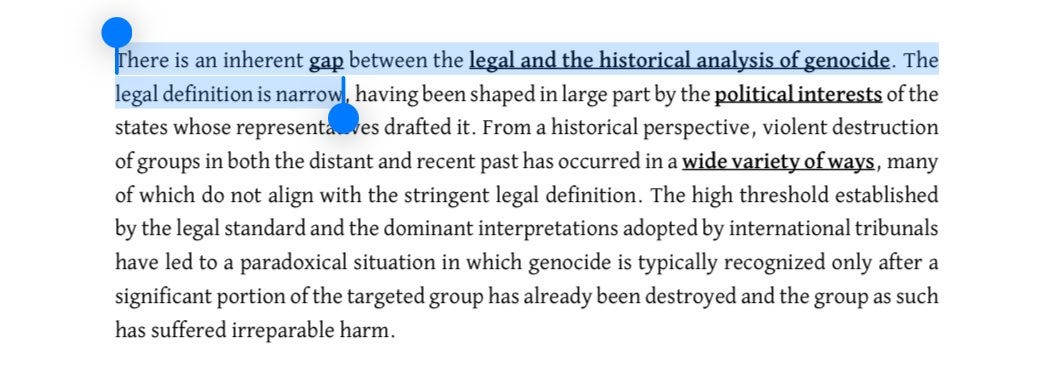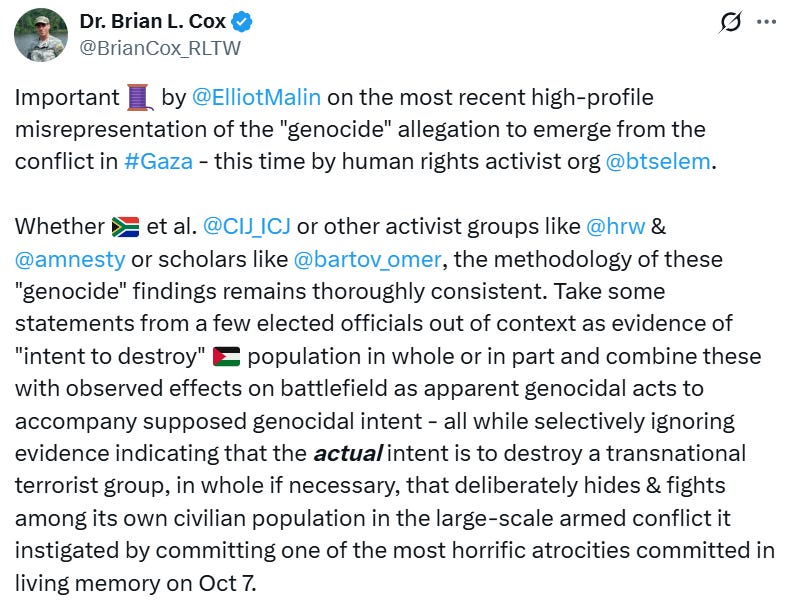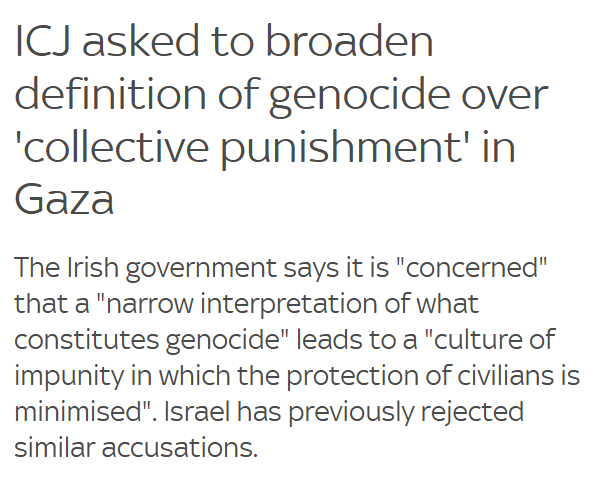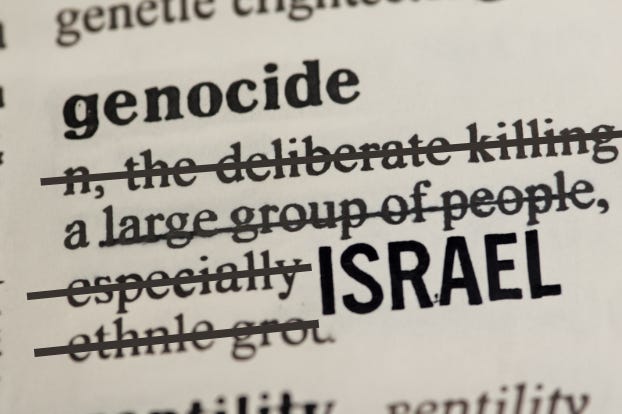How Nonprofits Redefine "Genocide" to Target Israel
Critics slam the new report from the Israeli organization B'Tselem as the latest example of a growing trend of linguistic manipulation and legal redefinitions aimed at delegitimizing Israel
On Monday, B'Tselem, Israel's most prominent human rights organization, became the first Israeli group to formally accuse its own country of committing genocide in Gaza. However, a close examination of their 40-page report reveals that the organization has broadened the legal definition of genocide in order to reach that conclusion, subverting long-established norms in the process.
The timing of B'Tselem's July 2025 report, titled "Our Genocide," coincides with a growing pattern among international bodies and rights organizations that appear to be systematically expanding legal definitions to apply specifically to Israel's actions. Critics argue this represents not rigorous legal analysis, but rather a coordinated effort to retrofit established international law to predetermined conclusions.

Analytical Scrutiny Reveals Definitional Drift
International humanitarian law expert and lawyer Elliot Malin was among the first to identify the concerning methodology within B'Tselem's report. In his detailed analysis, Malin highlighted how the organization's approach deviates from the established 1948 Genocide Convention, which requires proving specific intent to destroy a national, ethnic, racial, or religious group "in whole or in part."
B'Tselem's report acknowledges this traditional framework but then proceeds to construct what amounts to an alternative interpretation. "The term genocide refers to a socio-historical and political phenomenon involving acts committed with intent to destroy," the report states, notably expanding beyond the Convention's precise legal parameters to include broader "socio-historical" contexts B'Tselem.
Dr. Brian Cox, Adjunct Professor at Cornell University’s Law School, corroborated Malin's concerns, noting that such definitional flexibility creates dangerous precedents for international jurisprudence. The pattern, Cox argues, reflects a troubling trend where established legal frameworks are being modified to achieve specific political outcomes.

Attempts to Manipulate International Courts
The B'Tselem case represents just the latest instance in a broader campaign to reshape genocide definitions. Ireland's intervention in the International Court of Justice (ICJ) case against Israel explicitly seeks to "broaden its interpretation of what constitutes the commission of genocide by a state."
Irish Deputy Prime Minister Micheal Martin stated that his government is "concerned" about what he termed a "narrow interpretation of what constitutes genocide," arguing that such interpretations lead to a "culture of impunity." Martin emphasized that Ireland's "view of the convention is broader" and "prioritises the protection of civilian life.”
However, legal experts warn that Ireland's position fundamentally misunderstands the purpose of precise legal definitions. The 1948 Genocide Convention was crafted with deliberate specificity following the Holocaust, requiring clear evidence of intent to destroy specific groups. Ireland's push for broader interpretations potentially undermines decades of established international legal precedent.

The Redefinition of “Apartheid”
The definitional expansion extends beyond genocide to other charged terms. Amnesty International's 2022 report accusing Israel of "apartheid" employed similar methodological concerns, according to a comprehensive rebuttal by NGO Monitor. The analysis identified 287 specific flaws in Amnesty's report, including 102 factual errors, 97 misrepresentations, and deliberate omissions of contextual information NGO Monitor.
NGO Monitor's review revealed that Amnesty conducted minimal primary research, instead relying heavily on third-party sources from like-minded organizations. The report's footnotes notably lacked official government statistics, court documents, or current data, with much information being over a decade old.
Most concerning was Amnesty's explicit admission that it redefined “apartheid” in order to apply it to Israel.
Originally, apartheid referred to racial domination, but Amnesty applied it to Israel by including national and ethnic groups. Honest Reporting board member Salo Aizenberg argued in a 2022 article that Amnesty misinterprets international law in three key ways: 1) it broadens "racial" to include ethnic and national groups, 2) it fails to prove racial domination, and 3) it misapplies the legal standards of apartheid. Similar sentiments were shared by the Foundation for the Defense of Democracies.
A Broader Pattern of Terminological Expansion
The systematic redefinition of established legal terms to apply specifically to Israel represents a concerning development in international human rights discourse. Beyond "genocide" and "apartheid," organizations have increasingly employed expansive interpretations of terms like "ethnic cleansing," "war crimes," and "collective punishment" when discussing Israeli policies, according to observers of the trend.
This pattern differs markedly from how these same organizations analyze conflicts elsewhere. The selective application of broadened definitions raises fundamental questions about consistency and fairness in international legal analysis.
As B'Tselem's report gains international attention and Ireland's ICJ intervention advances, the legal community confronts an important crossroads. The discussion has broadened beyond Israel's specific actions to consider whether international legal frameworks should adapt to accommodate evolving interpretations—or whether their effectiveness rests on maintaining definitional consistency and universal application




It reads like the deep state of Israel is trying to murder its own people. It's time they were shut down and put out of business, including the unelected members of the Kenesset. What they are doing is Treason.
In other words…. The 21st century version of the blood libel.
Why is anyone surprised….
Wherever you go, there you are.